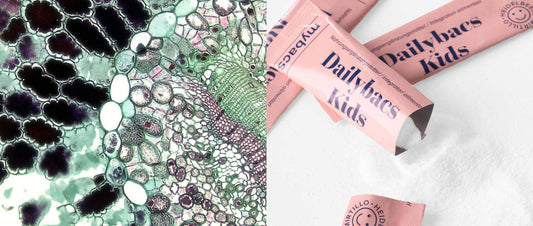The flu season is here, and children in particular have to contend with around 8-9 infections every year. Strengthening the immune system is crucial during this time. In this article, we look at the development of the immune system in children, the causes of weakened immunity and ways to strengthen it in the long term.
How does my child's immune system develop?
Our immune system is complex and multi-layered. It is a long process that begins in the womb until the immune system is fully developed. The placenta supplies the unborn child with important antibodies that protect the small, sensitive body system from its first contact with bacteria and other pathogens. This supply continues through breast milk. The newborn is more or less equipped with antibodies that the mother has developed through contact with certain pathogens. This means that these defence mechanisms can vary depending on the environment. However, this protection weakens again in the first year of life, as the child's body becomes more independent and is now left to its own devices. The immune system is therefore still very weak and has a simple basis on which it is now gradually building up.
What does "immunisation" mean?
This passive immunisation, which already takes place in the womb, provides two crucial components: the so-called killer and phagocytes. They belong to the white blood cells and are omnivorous, so to speak, because they can recognise and destroy a range of dangerous pathogens. Although we are born with a non-specific immune system, this also becomes stronger and more successful in its task over time.
In addition to the non-specific immune defence, there is the specific immune defence, which is the main artery in the development of the immune system. This defence mechanism can specifically recognise every pathogen and thus marks the memory with certain antibodies. These antibodies can then immediately recognise who the intruder is in the event of repeated attacks. As soon as this categorisation has taken place, the pathogen is passed on to the phagocytes and killer cells as food. In this way, an infection can be warded off quickly and effectively. If such an encounter has taken place, the body can develop a specific immunity, for example against measles, mumps, etc.
What are the causes of a weakened immune system in children?
In the beginning, a small body has to fight a whole range of enemies. Whether in the toddler group, playing in the sandpit or at school - children are constantly in contact with other children and the outside world. This means they are constantly exposed to bacteria and viruses from the environment.
This topic is omnipresent in schools and nurseries - whether middle ear infections, colds and respiratory tract infections - gastrointestinal infections are also part of it. The motto here is: Obstacles and difficulties only make your child stronger! Every new infection helps to ensure that the immune system is better equipped. It is a very strenuous process for the organism to get to this point, but at the same time it is also crucial, vital training for a robust body system.
The immune system is more vulnerable during the cold winter months. During these times, the body can wage a veritable battle against infections and so easily gets sucked into the maelstrom of infection. Young children are often in close physical contact with others and are not as good as adults at understanding and adhering to hygiene measures such as regular hand washing and blowing their nose. A lack of important nutrients, mental and physical stress or too little sleep are also often the triggers for this chain reaction. With each new attack, the immune defence loses strength and energy. This makes it all the more important to actively support the body with good nutrition and additional vitamins. The whole family can take part, as the parents' immune defences are also challenged, but ultimately strengthened, by contact with new pathogens.
How can I strengthen my child's immune system?
A strong immune system needs fuel to work diligently and effectively. This fuel is in the form of valuable nutrients, which usually come from the right foods. However, despite the abundance of food in our modern society, the immune system often suffers from a "lack of fuel".
But why is that? In fact, the cause can be traced back to the fact that we have almost too much choice and therefore make decisions that are not necessarily the best for our health. Children in particular attach more importance to flavour than to the health effects of eating certain foods. This is why they are known for having a relatively one-sided diet. Of course, you can't blame them for that. What child doesn't love colourful and sweet? Although there is a variety of colours and playful shapes in the popular children's ranges, the essential nutrients are usually very low or non-existent.
A long-term study by the Robert Koch Institute shows that children in Germany eat too little fruit and vegetables if you consider the generally recommended amounts. The DGE (German Nutrition Society) also found that German children eat too little fruit and vegetables on average. Parents must therefore see it as their responsibility to familiarise their offspring with healthy eating, develop an understanding of the exciting variety of healthy foods and thus give them a good basis for the future.
Introducing children to a healthy diet can sometimes be difficult because children ask themselves: Why should I eat something I don't like? A legitimate question.
How can I get children interested in healthy eating?
"Motivation instead of coercion" has always worked well so far. Forcing children to eat up can have the opposite effect of encouraging a positive attitude towards healthy eating. Experts still advise against using food as a reward or punishment. Many people know from their childhood when you have to "earn" something sweet first, especially if you have to eat the "bad" vegetables first. Sweets are therefore associated with something positive, while fruit and vegetables are associated with something negative. Finding a balance by not forbidding everything sweet or unhealthy, but allowing it in moderation, is a very effective measure. Because it depends on the quantity. Finding a middle ground is also good discipline training!
In addition, children can be involved in shopping and cooking in a playful way. Regularly trying out new things also brings more fun and variety to children's eating habits. In this way, "the unknown" is better accepted and not immediately rejected without giving the food a chance.
It can actually take up to seven attempts before a child can clearly say how he or she feels about a particular food - or whether he or she doesn't like it. If nothing helps, you can also hide the unwanted vegetables - for example in sauces, soups or purees. In any case, it is important that you set a good example and - if possible - celebrate the meal together at the table!
What exactly does my child's immune system need?
Vitamins and trace elements are the necessary building blocks for stimulating the immune system. For example, they are responsible for the formation of new defence cells and substances. The right diet supplies the body with important micronutrients. We have listed some examples:
- Iron: Wholemeal bread, spinach
- Vitamin D: salmon, eggs
- Selenium: Kohlrabi, broccoli
- Zinc: cheese, potatoes
- Vitamin C: citrus fruits, peppers
With a few exceptions, the human organism is not able to produce vitamins, trace elements and minerals itself. This means that our body is almost 100% dependent on the nutrients we take in with our food. The right supply is not only important during growth, but micronutrients are essential throughout life. The metabolism, the energy balance, the nervous system and ultimately the all-encompassing immune system depend on these building blocks.
If vitamins and minerals are not consumed in sufficient quantities, it is possible to supplement them with food supplements. Our food supplement Dailybacs Kids contains live bacterial strains that can promote a balanced intestinal flora in children and strengthen the immune system. Even at a young age, the intake of good bacteria offers numerous benefits for the immune system and the prevention of the development of allergies. The
Dailybacs Kids are true all-rounders, because a special selection of highly effective ingredients is concentrated in a single sachet: a formulation of good bacteria for improved digestion and thus improved nutrient absorption. Irrespective of this, these elements also contribute to specific mechanisms. Iodine, for example, is a mineral that supports a child's normal growth. For this reason, we have developed our Dailybacs Kids especially for the needs of children.
In addition to nutrition, children's immune systems can also be strengthened with other aids. Here are a few valuable tips:
- A lot of exercise - team sports such as football or volleyball are a lot of fun and provide both exercise and balance. Exercise is important for a strong immune system.
- Get some fresh air - Regardless of the weather, you should definitely take the opportunity to get out into the fresh air with the right equipment. Contact with the environment strengthens the body through thermoregulation, thus arming it against infections. Other stimuli such as dirt and other organisms are important companions for the formation of the immune system.
- Silent time - when you're bored, you have to rely on your own creativity. Such moments are also important, because a fully planned week can build up stress and thus weaken the immune system.
- Sufficient sleep - Even children who attend primary school need 10-11 hours of restful sleep.
- Supports the intestinal flora - With probiotics, fibre, vitamins, trace elements and vegetable protein for the formation of antibodies and immune cells. Of course, this also includes a balanced diet. Food supplements can supply the missing substances and boost the intake a little.
- Regular hygiene, but no hygiene mania - Teach children to wash their hands regularly from an early age. A little tip: there are many good children's books that explain this clearly. On the other hand, a hygiene mania should be avoided - because an overly sterile environment does not provide the immune system with enough stimuli to train a better defence.
- Drink enough - water or unsweetened tea. The mucous membranes must remain moisturised in order to ward off pathogens. They dry out easily in winter because we spend a lot of time in heated rooms and the humidity is very low.
- Kneipp cold-warm baths on the legs of children activate the immune system. You should pay very close attention to the temperature, as too great a temperature difference can overstress the body. Children are more sensitive to temperature differences than adults.
Can probiotics support my child's immune system?
The intestinal flora is an important component of the immune system. Various genetic, environmental and nutritional factors can influence the gut microbiome-immune system axis as early as the developmental phase in the first three years of life. For babies who have already been exposed to certain risk factors (genetic predisposition, caesarean section, lack of breast milk, medication, etc.)), the intake of probiotics seems particularly sensible. Probiotics can positively support the best possible development of the immune system, strengthen the body's defences and better protect children from infections. Find out more about probiotics in our article Probiotics - Everything you need to know.
With the above tips, your children's immune system should not only be prepared for the cold winter months, but should already have a strong, basic foundation for adulthood. With continuous support through proper nutrition, probiotics and important micronutrients, nothing stands in the way of a healthy balance and fun for the little ones!
Sources
https://biomes.world/de/wissenswertes/immunsystem/immunsystem-staerken-kinder/
https://www.smarticular.net/immunsystem-kinder-staerken-hausmittel-methoden/











